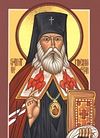

| Previous day | Next day |
| Old Style
February 3
|
Saturday |
New Style
February 16
|
| 38th Week after Pentecost. Tone 4. | No fast.
|
![]() Afterfeast of the Meeting of Our Lord.
Afterfeast of the Meeting of Our Lord. ![]() Holy and Righteous Symeon the God-receiver and Anna the Prophetess (1st c.).
Holy and Righteous Symeon the God-receiver and Anna the Prophetess (1st c.). ![]() St. Nicholas, Equal-to-the-Apostles, enlightener of Japan (1912).
St. Nicholas, Equal-to-the-Apostles, enlightener of Japan (1912).
Prophet Azariah (10th c. в до Р.10th c..). Martyrs Papias, Diodorus, and Claudianus, at Perge in Pamphylia (250). Martyr Blaise of Caesarea in Cappadocia (3rd c.). Martyrs Adrian and Eubulus, at Caesarea in Cappadocia (ca. 308-309). St. Romanus, prince of Uglich (1285). St. Symeon, bishop of Polotsk and Tver (1289). St. Svyatoslav-Gabriel and his son St. Dimitry, of Yuriev (1253). St. Ignatius of Mariupol in Crimea, metropolitan of Gothia and Kafa (1786).
New Hieromartyrs Vladimir (Zagreba), hieromonk of Borisoglebsk Monastery (Novotorzhok), Basil Zalessky, archpriest, of Astrakhan, and Adrian Troitsky, archpriest, of Kazan (1938).
Martyr Paul the Syrian (284-305). St. Lawrence, archbishop of Canterbury (619). St. Werburga of Chester, abbess (ca. 700). St. Ansgar, bishop of Hamburg, enlightener of Denmark and Sweden (865). St. James, archbishop of Serbia (1292). St. Sabbas of Ioannina (15th c.). New Martyrs Stamatius and John, brothers, and Nicholas, their companion, at Spetses on Chios (1822).
Repose of Schemamonk Paul of Simonov Monastery (1825), disciple of St. Paisius (Velichkovsky), and Hieromonk Isidore of Gethsemane Skete, Moscow (1908).
Thoughts for Each Day of the Year
According to the Daily Church Readings from the Word of God
By St. Theophan the Recluse

Saturday. [II Tim. 2:11–19; Luke 18:2–8]
To more strongly impress the truth that men ought always to pray, and not to faint (Luke 18:1) and that if their prayer is not soon heard, that they should continue to pray, the Lord told a parable about the judge who did not fear God and neither regarded man. The judge complied at last with the widow’s petition, not because he feared God and regarded man, but only because that widow would not give him peace. So, if such a callous man could not withstand the persistence of this woman’s petition, will not God, who loves mankind and is filled with mercy, fulfil a petition raised up to Him persistently, with tears and contrition?! Here is the answer to why our prayers are often not heard: Because we do not send up our petitions to God zealously, but as though in passing; furthermore, we pray once today, then expect our prayer to be answered by tomorrow, not thinking to sweat and trouble ourselves any more in prayer. That is why our prayer is neither heard nor answered. We ourselves do not fulfil as we ought the law laid down for prayer—the law of hope-filled and zealous persistence.
Articles
 Prophet AzariahThe name Azariah means “whom God helps.” The holy prophet lived during King Asa’s reign (2 Chron. 15:1). |
 Martyrs Papias, Diodorus, and Claudianus, at Perge in PamphyliaSaint Papias was martyred with Saint Claudianus at Perge, Pamphylia in 250. |
 Martyr Blaise of Caesarea, in CappadociaSaint Blaise of Caesarea lived in the third century. He was from Caesarea in Cappadocia (Asia Minor) and was a shepherd. |
 Martyr Adrian at Caesarea, CappadociaSaint Adrian of Baneas of Caesarea in Cappadocia. suffered martyrdom under Governor Firmilianus. |
 Martyr Eubulus at Caesarea, CappadociaSaint Eubulus, like Saint Adrian, was from Baneas, in Caesarea of Cappadocia. |
 St. Simeon the Bishop of Polotsk and TverSaint Simeon, Bishop of Tver was descended from the Polotsk princes. He was the seventh bishop of Polotsk and the first bishop of the Tver diocese. |






